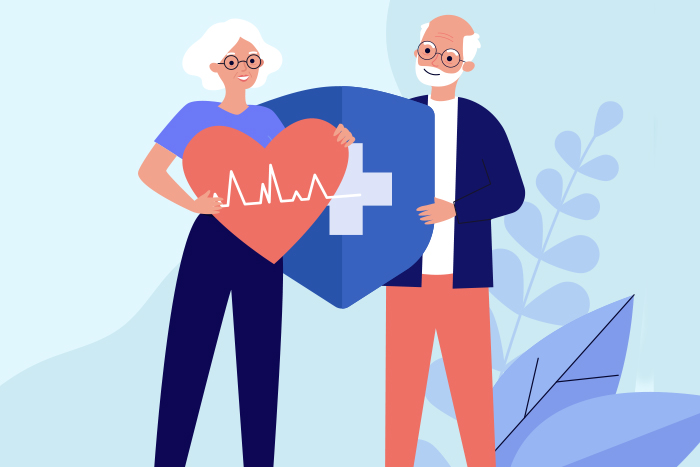The Connection Between Anxiety and Heart Health
Everyone feels a little anxious or stressed once in a while. But when anxiety sticks around too long, it can affect more than just your mood—it can also put extra strain on your heart. For older adults, who may already be managing other health conditions, it's especially important to understand the link between anxiety and heart health. The good news is there are simple ways to protect your heart and your mind.
How Anxiety Affects Your Heart
When you feel anxious, your body goes into "fight or flight" mode. This is your body’s natural way of preparing to face danger. Your heart beats faster, your blood pressure goes up, and your muscles tighten.
If this happens every once in a while, it’s usually not a big problem. But if you feel anxious often, your heart can stay under extra pressure for too long. Over time, this stress can:
Raise your blood pressure
Make your heart beat too fast
Increase your risk of heart disease
Mental health challenges like anxiety can lead to behaviors that hurt the heart, like smoking, overeating, or avoiding exercise.
It's important to remember: feeling anxious isn’t your fault. It’s a health issue, just like high blood pressure or diabetes. And it can be treated.
Common Signs of Anxiety That May Affect the Heart
Sometimes, it’s hard to tell the difference between anxiety symptoms and heart problems. Both can cause:
Chest tightness or pain
Shortness of breath
A racing or pounding heart
Dizziness or feeling lightheaded
Sweating or shaking
If you notice any of these symptoms and aren't sure if it’s anxiety or something more serious, it’s always safest to call your doctor or 911 right away. Never ignore chest pain or trouble breathing.
Stress, Anxiety, and Heart Disease
Stress and anxiety can directly affect your heart health over time. Chronic (long-term) stress can lead to problems such as:
High blood pressure (hypertension)
Inflammation in the blood vessels
Irregular heart rhythms
A higher chance of heart attacks or strokes
If you notice any of these symptoms and aren't sure if it’s anxiety or something more serious, it’s always safest to call your doctor or 911 right away. A medical alert device can also help you get emergency assistance quickly if you're alone and need help fast.* Never ignore chest pain or trouble breathing.
Simple Ways to Protect Your Heart and Ease Anxiety
The good news is that you don't have to make big changes all at once. Small steps can help ease anxiety and keep your heart healthier:
1. Practice Deep Breathing
Take a few minutes each day to sit quietly and breathe deeply. Inhale slowly through your nose, hold for a few seconds, and breathe out through your mouth. Deep breathing helps lower your heart rate and blood pressure.
2. Keep Moving
Gentle exercise, like walking or stretching, can lower stress and strengthen your heart. Aim for about 30 minutes most days of the week. If you're new to exercise, start slow and talk to your doctor first.
3. Get Good Sleep
Poor sleep can make anxiety and heart problems worse. Try to go to bed and wake up at the same time every day. Make your bedroom quiet and comfortable, and avoid screens before bedtime.
4. Stay Connected
Spending time with friends and family can ease stress. Even a quick phone call can lift your mood. Don’t be afraid to reach out to others when you're feeling overwhelmed.
5. Limit Caffeine and Alcohol
Both caffeine and alcohol can increase anxiety and strain your heart. Try to drink more water and limit coffee, soda, energy drinks, and alcohol.
6. Talk to a Doctor
If anxiety is making it hard to enjoy your daily life, talk to your doctor. They can suggest treatments that may include therapy, medications, or other support. You don't have to handle it alone.
When to Seek Help for Anxiety
It's important to get help if:
You feel anxious most days
Anxiety is making it hard to sleep, eat, or enjoy life
You have chest pain or trouble breathing
A healthcare provider can help figure out if your symptoms are from anxiety, heart issues, or something else. Getting care early can protect your health and give you peace of mind.
Taking the First Step Toward a Healthier Heart and Mind
Anxiety and heart health are closely connected, but the good news is you have the power to make positive changes. By taking small steps each day—whether it's breathing deeply, staying active, or talking with someone you trust—you can protect both your heart and your well-being. Remember, it’s never too late to take charge of your health. Every step you take toward managing stress is a step toward feeling better, living longer, and enjoying life more fully.
Sources:
American Heart Association: How Does Your Mental Health Affect the Heart?
Centers for Disease Control and Prevention: About Heart Disease and Mental Health
*Disclaimer: Healthcare Select may earn a commission if you purchase a product or service through links to our partners. This comes at no extra cost to you.

